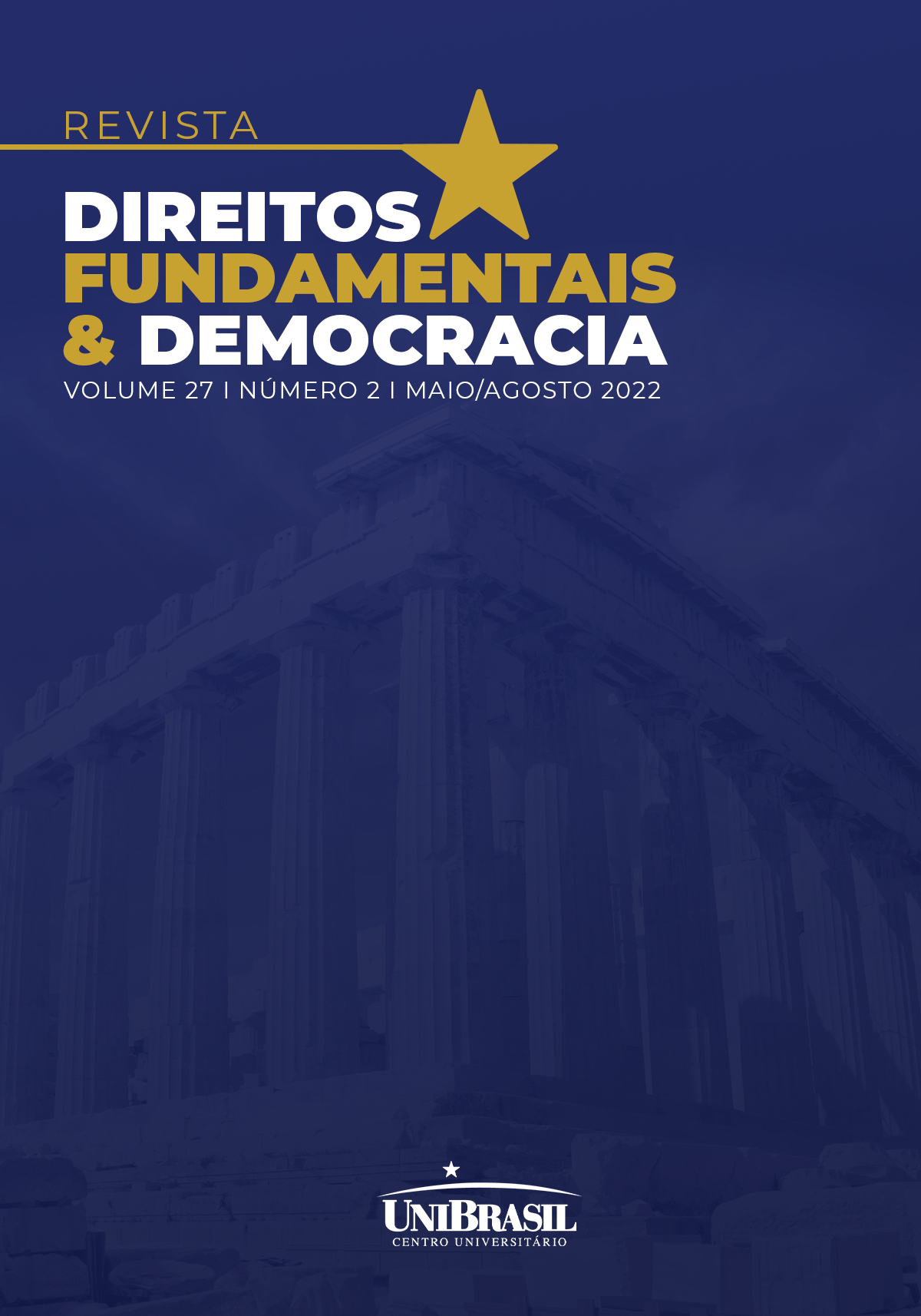BRAZILIAN SUPREME COURT AND THE CRIMINALIZATION OF HOMOTRANSPHOBIA
JUDICIAL ACTIVISM OR GUARANTIST CONSTITUTIONALISM?
DOI:
https://doi.org/10.25192/issn.1982-0496.rdfd.v27i22201Abstract
The Brazilian Supreme Court, in the Direct Action of Unconstitutionality due to Omission no. 26 (ADO 26) judgment, gave interpretation according to the constitution for Brazilian Statute Law no. 7.716 of 1989, in order to classify homotransphobia as species of the genus racism and criminalize it, and this decision was criticized for excessive judicial activism. The purpose of this article is to analyze if the ADO 26 was trully activist. The article contrasts the two main contemporary theories of constitutional interpretation - judicial activism and guarantist constitutionalism - to conclude that there wasn’t judicial activism in that judgment. Instead, the Brazilian Supreme Court would have been based on guarantist constitutionalism. By considering homotransphobic practices as species of the racism genre, the Court didn't use analogy, didn't discharge the interpositio legis, nor did it apply the balancing principles method, usual solutions in judicial activism. In this case, the Brazilian Supreme Court reaffirmed its jurisprudence around the concept of racism, which shouldn't be limited to strictly biological or phenotypic aspects, but must be understood in its social dimension.
Downloads
References
ALFAGEME, Ana. Morrer por ser gay: o mapa-múndi da homofobia. El País, 22 mai. 2019. Disponível em: https://brasil.elpais.com/brasil/2019/03/19/internacional/1553026147_774690.html. Acesso em: 28 mai. 2020.
BATISTA, Fabiana. Brasil registra 124 assassinatos de transexuais em 2019, segundo dossiê. UOL, 29 jan. 2020. Disponível em: https://www.uol.com.br/universa/noticias/redacao/2020/01/29/dossie-de-violencia-contra-pessoas-trans-em-2019.htm. Acesso em: 28 mai. 2020.
CADEMARTORI, Sérgio Urquhart; STRAPAZZON, Carlos Luiz. Sistema garantista e protagonismo judicial. In: FERRAJOLI, Luigi; STRECK, Lenio Luiz; TRINDADE, André Karam (Org.). Garantismo, hermenêutica e (neo)constitucionalismo) – um debate com Luigi Ferrajoli. Porto Alegre: Livraria do Advogado, 2012. p. 207-227.
CADEMARTORI, Sérgio Urquhart; STRAPAZZON, Carlos Luiz. Principia iuris: uma teoria normativa do direito e da democracia. Pensar, Fortaleza, v. 15, n. 1, p. 278-302, jan./jun. 2010
CANOTILHO, José Joaquim Gomes. Constituição dirigente e vinculação do legislador: contributo para a compreensão das normas constitucionais programáticas. 2. ed. Coimbra: Coimbra Editora, 2001.
DIAS, Eduardo Rocha; SÁ, Fabiana Costa Lima de. O ativismo judicial à luz do pensamento de Konrad Hesse sobre a força normativa da Constituição. Revista de Informação Legislativa (RIL), Brasília, v. 57, n. 225, p. 165-179, jan./mar. 2020.
FERRAJOLI, Luigi. Constitucionalismo principialista e constitucionalismo garantista. Trad. André Karam Trindade. In: FERRAJOLI, Luigi: STRECK, Lenio Luiz; TRINDADE, André Karam (Org.). Garantismo, hermenêutica e (neo)constitucionalismo – um debate com Luigi Ferrajoli. Porto Alegre: Livraria do Advogado, 2012. p. 13-56.
FERRAJOLI, Luigi. Diritto e ragione: teoria del garantismo penale. Roma-Bari: Laterza, 1989.
FERRAJOLI, Luigi. Epistemologia jurídica y garantismo. Ciudad de México: Fontamara, 2004.
FERRAJOLI, Luigi. Principia Iuris. Teoria do direito e da democracia. Bari: Laterza, 2007. (Partes 1, 2 e 3).
FERRAJOLI, Luigi. Democracia y garantismo. Ed. Miguel Carbonell. Madrid: Trotta, 2008.
GARAPON, Antoine. O guardador de promessas: justiça e democracia. Trad. Francisco Aragão. Lisboa: Instituto Piaget, 1996.
HESSE, Konrad. A força normativa da constituição. Trad. Gilmar Ferreira Mendes. Porto Alegre: Sergio Antonio Fabris Editor, 1991.
IPPOLITO, Dario. O garantismo de Luigi Ferrajoli. Trad. Hermes Zaneti Júnior. Revista de Estudos Constitucionais, Hermenêutica e Teoria do Direito (RECHTD), São Leopoldo, v.3 (1), p. 34-41, jan./jun. 2011.
MARSHALL, Willian P. Conservatism and the Seven Signs of Judicial Activism. University of Colorado Law Review, Chapel Hill, n. 73, p. 101-140. 2002.
MONTESQUIEU, Barão de (Charles-Louis de Secondat). Do espírito das leis. Trad. Pedro Vieira Mota. São Paulo: Saraiva, 2008.
OLIVEIRA NETO, Francisco José Rodrigues de. A estrita legalidade como limitador democrático da atividade jurisdicional. Pensar, Fortaleza, v. 16, n. 2, p. 527-561, jul./dez. 2011.
POGREBINSCHI, Thamy. Ativismo judicial e direito: considerações sobre o debate contemporâneo. Direito, Estado e sociedade. Rio de Janeiro: PUC, 2000.
RIOS, Roger Raupp. Perspectivas e tensões no desenvolvimento dos Direitos Sexuais no Brasil. Revista de Informação Legislativa (RIL), Brasília, a. 52, n. 207, p. 331-353, jul./set. 2015.
SANTIAGO, Nestor; MAGALHÃES, Allan Carlos Moreira. Mandado de injunção e garantismo: a insuficiência das normas regulamentadoras. Quaestio Iuris, Rio de Janeiro, v. 12, n. 01, p. 208-229. 2019.
STRECK, Lenio Luiz. Hermenêutica jurídica e(m) crise – uma exploração hermenêutica da construção do direito. 5. ed. Porto Alegre: Livraria do Advogado, 2004.
TEIXEIRA, Anderson Vichinkeski. Ativismo judicial: nos limites entre racionalidade jurídica e decisão política. Revista Direito GV, São Paulo, v. 8, p. 37-57. 2012.
TRINDADE, André Karam. Garantismo versus neoconstitucionalismo: os desafios do protagonismo judicial em terrae brasilis. In: FERRAJOLI, Luigi; STRECK, Lenio;
TRINDADE, André Karam (Org.). Garantismo, hermenêutica e (neo)constitucionalismo: um debate com Luigi Ferrajoli. Porto Alegre: Livraria do Advogado, 2012. p. 95-131.
VERDE SOBRINHO, Luis Lima. Ativismo cego, espada amolada: ensaio sobre revisão judicial de atos políticos. Resenha Eleitoral (TRE-SC), Florianópolis, v. 24, n. 1, p. 105-128. 2020.
WOLFE, Christopher. The rise of modern judicial review: from constitutional interpretation to judge-made law. Nova York: Rowman & Littefieleld, 1994.

Downloads
Published
How to Cite
Issue
Section
License
Copyright (c) 2022 Luis Lima Verde Sobrinho, Nestor Santiago

This work is licensed under a Creative Commons Attribution-NonCommercial-ShareAlike 4.0 International License.
Copyrights for any articles published in the journal are given to the author and RDFD with first publication rights granted to the Journal. By virtue of their appearance in this open access journal, articles are free to use, with proper attribution, for educational and other non-commercial purposes in accordance with the creative commons.



